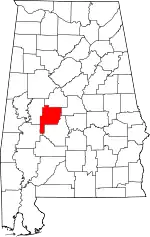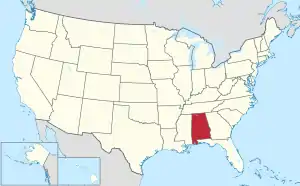Perry County, Alabama
Perry County is a county located in the Black Belt region in the central part of the U.S. state of Alabama. As of the 2020 census, the population was 8,511.[1] Its county seat is Marion.[2] The county was established in 1819 and is named in honor of Commodore Oliver Hazard Perry of Rhode Island and the United States Navy.[3] As of 2020, Perry County was the only county in Alabama, and one of 40 in the United States, not to have access to any wired broadband connections.[4]
Perry County | |
|---|---|
 Perry County courthouse in Marion | |
 Location within the U.S. state of Alabama | |
 Alabama's location within the U.S. | |
| Coordinates: 32°38′09″N 87°17′31″W | |
| Country | |
| State | |
| Founded | December 13, 1819 |
| Named for | Oliver Hazard Perry |
| Seat | Marion |
| Largest city | Marion |
| Area | |
| • Total | 724 sq mi (1,880 km2) |
| • Land | 720 sq mi (1,900 km2) |
| • Water | 4.2 sq mi (11 km2) 0.6% |
| Population (2020) | |
| • Total | 8,511 |
| • Estimate (2022) | 8,035 |
| • Density | 12/sq mi (4.5/km2) |
| Time zone | UTC−6 (Central) |
| • Summer (DST) | UTC−5 (CDT) |
| Congressional district | 7th |
| Website | www |
| |
History
In 1935, a sharecropper called Joe Spinner Johnson was organizing sharecroppers into a union. His landlord called him away from his job, and gave him up to a gang of whites. They tied him up, beat him, and took him to Selma, where he was thrown in jail. Other prisoners heard him screaming and being beaten. A few days later, his mutilated body turned up near Greensboro.[5]
The Perry County town of Marion was the site of a 1965 killing of an unarmed Black man, Jimmie Lee Jackson, by a white state trooper, James Bonard Fowler, which sparked the Selma to Montgomery marches. In 2008, the county voted to establish a Barack Obama Day, a legal holiday, every second Monday of November.[6]
Geography
According to the United States Census Bureau, the county has a total area of 724 square miles (1,880 km2), of which 720 square miles (1,900 km2) is land and 4.2 square miles (11 km2) (0.6%) is water.[7] The county boasts a diverse geography, with the southern half of the county being located in the Gulf Coastal Plain region, and the northern half of the county being located in the far southern extensions of the foothills of the Ridge-and-Valley Appalachians. This area is mainly forested, with some hills and valleys.[8]
Major highways
Adjacent counties
- Bibb County (north)
- Chilton County (northeast)
- Dallas County (east)
- Marengo County (southwest)
- Hale County (west)
National protected area
- Talladega National Forest (part)
Demographics
| Census | Pop. | Note | %± |
|---|---|---|---|
| 1820 | 3,646 | — | |
| 1830 | 11,490 | 215.1% | |
| 1840 | 19,086 | 66.1% | |
| 1850 | 22,285 | 16.8% | |
| 1860 | 27,724 | 24.4% | |
| 1870 | 24,975 | −9.9% | |
| 1880 | 30,741 | 23.1% | |
| 1890 | 29,332 | −4.6% | |
| 1900 | 31,783 | 8.4% | |
| 1910 | 31,222 | −1.8% | |
| 1920 | 25,373 | −18.7% | |
| 1930 | 26,385 | 4.0% | |
| 1940 | 26,610 | 0.9% | |
| 1950 | 20,439 | −23.2% | |
| 1960 | 17,358 | −15.1% | |
| 1970 | 15,388 | −11.3% | |
| 1980 | 15,012 | −2.4% | |
| 1990 | 12,759 | −15.0% | |
| 2000 | 11,861 | −7.0% | |
| 2010 | 10,591 | −10.7% | |
| 2020 | 8,511 | −19.6% | |
| 2022 (est.) | 8,035 | [9] | −5.6% |
| U.S. Decennial Census[10] 1790–1960[11] 1900–1990[12] 1990–2000[13] 2010–2020[1] | |||
2020 Census
| Race / Ethnicity | Pop 2000[14] | Pop 2010[15] | Pop 2020[16] | % 2000 | % 2010 | % 2020 |
|---|---|---|---|---|---|---|
| White alone (NH) | 3,642 | 3,142 | 2,345 | 30.71% | 29.67% | 27.55% |
| Black or African American alone (NH) | 8,057 | 7,244 | 5,914 | 67.93% | 68.40% | 69.49% |
| Native American or Alaska Native alone (NH) | 9 | 17 | 15 | 0.08% | 0.16% | 0.18% |
| Asian alone (NH) | 4 | 30 | 10 | 0.03% | 0.28% | 0.12% |
| Pacific Islander alone (NH) | 2 | 5 | 1 | 0.02% | 0.05% | 0.01% |
| Some Other Race alone (NH) | 1 | 4 | 0 | 0.01% | 0.04% | 0.00% |
| Mixed Race/Multi-Racial (NH) | 44 | 35 | 137 | 0.37% | 0.33% | 1.61% |
| Hispanic or Latino (any race) | 102 | 114 | 89 | 0.86% | 1.08% | 1.05% |
| Total | 11,861 | 10,591 | 8,511 | 100.00% | 100.00% | 100.00% |
As of the 2020 United States census, there were 8,511 people, 3,070 households, and 1,476 families residing in the county.
2010 census
As of the 2010 United States Census, there were 10,591 people living in the county. 68.7% were Black or African American, 30.3% White, 0.3% Asian, 0.2% Native American, 0.2% of some other race and 0.4% of two or more races. 1.1% were Hispanic or Latino (of any race).
2000 census
As of the census[17] of 2000, there were 11,861 people, 4,333 households, and 3,046 families living in the county. The population density was 16 people per square mile (6.2 people/km2). There were 5,406 housing units at an average density of 8 units per square mile (3.1 units/km2). The racial makeup of the county was 68.38% Black or African American, 30.86% White, 0.08% Native American, 0.03% Asian, 0.03% Pacific Islander, 0.08% from other races, and 0.54% from two or more races. Nearly 0.86% of the population were Hispanic or Latino of any race.
There were 4,333 households, out of which 33.80% had children under the age of 18 living with them, 40.40% were married couples living together, 25.10% had a female householder with no husband present, and 29.70% were non-families. Nearly 27.90% of all households were made up of individuals, and 12.00% had someone living alone who was 65 years of age or older. The average household size was 2.63, and the average family size was 3.23.
In the county, the population was spread out, with 29.80% under the age of 18, 11.10% from 18 to 24, 23.60% from 25 to 44, 20.70% from 45 to 64, and 14.90% who were 65 years of age or older. The median age was 33 years. For every 100 females, there were 83.90 males. For every 100 females age 18 and over, there were 78.40 males.
The median income for a household in the county was $20,200, and the median income for a family was $26,150. Males had a median income of $26,272 versus $16,839 for females. The per capita income for the county was $10,948. About 31.20% of families and 35.40% of the population were below the poverty line, including 48.90% of those under age 18 and 25.80% of those age 65 or over.
Government
| Year | Republican | Democratic | Third party | |||
|---|---|---|---|---|---|---|
| No. | % | No. | % | No. | % | |
| 2020 | 1,339 | 25.60% | 3,860 | 73.80% | 31 | 0.59% |
| 2016 | 1,407 | 26.66% | 3,824 | 72.45% | 47 | 0.89% |
| 2012 | 1,506 | 24.68% | 4,568 | 74.87% | 27 | 0.44% |
| 2008 | 1,679 | 27.26% | 4,457 | 72.37% | 23 | 0.37% |
| 2004 | 1,738 | 31.47% | 3,767 | 68.21% | 18 | 0.33% |
| 2000 | 1,732 | 29.93% | 4,020 | 69.47% | 35 | 0.60% |
| 1996 | 1,703 | 28.85% | 4,053 | 68.66% | 147 | 2.49% |
| 1992 | 1,829 | 31.46% | 3,712 | 63.86% | 272 | 4.68% |
| 1988 | 2,107 | 36.59% | 3,574 | 62.07% | 77 | 1.34% |
| 1984 | 2,600 | 48.08% | 2,731 | 50.50% | 77 | 1.42% |
| 1980 | 2,262 | 34.68% | 4,208 | 64.52% | 52 | 0.80% |
| 1976 | 2,164 | 32.38% | 4,486 | 67.13% | 33 | 0.49% |
| 1972 | 2,800 | 49.13% | 2,718 | 47.69% | 181 | 3.18% |
| 1968 | 308 | 5.55% | 2,457 | 44.25% | 2,788 | 50.21% |
| 1964 | 2,046 | 79.73% | 0 | 0.00% | 520 | 20.27% |
| 1960 | 744 | 41.52% | 973 | 54.30% | 75 | 4.19% |
| 1956 | 613 | 33.83% | 974 | 53.75% | 225 | 12.42% |
| 1952 | 756 | 35.80% | 1,352 | 64.02% | 4 | 0.19% |
| 1948 | 30 | 2.78% | 0 | 0.00% | 1,051 | 97.22% |
| 1944 | 47 | 4.46% | 1,004 | 95.35% | 2 | 0.19% |
| 1940 | 39 | 2.51% | 1,509 | 97.17% | 5 | 0.32% |
| 1936 | 24 | 1.55% | 1,527 | 98.45% | 0 | 0.00% |
| 1932 | 37 | 2.54% | 1,382 | 95.05% | 35 | 2.41% |
| 1928 | 459 | 26.97% | 1,242 | 72.97% | 1 | 0.06% |
| 1924 | 25 | 2.59% | 928 | 96.17% | 12 | 1.24% |
| 1920 | 34 | 2.74% | 1,195 | 96.14% | 14 | 1.13% |
| 1916 | 20 | 2.16% | 895 | 96.44% | 13 | 1.40% |
| 1912 | 3 | 0.39% | 731 | 93.84% | 45 | 5.78% |
| 1908 | 12 | 1.52% | 776 | 97.98% | 4 | 0.51% |
| 1904 | 47 | 5.00% | 799 | 85.00% | 94 | 10.00% |
Communities
Places of interest
Perry County is home to Perry Lakes Park, part of the Talladega National Forest, the Alabama Women's Hall of Fame located at Judson College, and Marion Military Institute.
See also
References
- "State & County QuickFacts". United States Census Bureau. Retrieved September 9, 2023.
- "Find a County". National Association of Counties. Retrieved June 7, 2011.
- Owen, Thomas McAdory; Owen, Marie Bankhead (1921). History of Alabama and dictionary of Alabama biography. Vol. 2. Chicago: S.J. Clarke Publishing Company. p. 1108.
- Analytics, Julia Tanberk Julia is the Manager of; Broadb, Data Science at; broadb, Now She writes about; Divide, Industry Issues Such as the Digital; Access, Internet; pricing; Behavior, Consumer; Visualizations, Enjoys Creating Unique Data; Datasets, Maps of Complex. "United States County Broadband Statistics for 2020 - BroadbandNow.com". BroadbandNow. Retrieved July 30, 2022.
- "Lynching in America: Confronting the Legacy of Racial Terror". Equal Justice Initiative. 2017. Retrieved May 29, 2021.
- Bello, Marisol (January 26, 2009). "Renamed schools, streets mark early tributes to Obama". USA Today.
- "2010 Census Gazetteer Files". United States Census Bureau. August 22, 2012. Retrieved August 22, 2015.
- "Perry County".
- "Annual Estimates of the Resident Population for Counties: April 1, 2020 to July 1, 2022". Retrieved September 9, 2023.
- "U.S. Decennial Census". United States Census Bureau. Retrieved August 22, 2015.
- "Historical Census Browser". University of Virginia Library. Retrieved August 22, 2015.
- Forstall, Richard L., ed. (March 24, 1995). "Population of Counties by Decennial Census: 1900 to 1990". United States Census Bureau. Retrieved August 22, 2015.
- "Census 2000 PHC-T-4. Ranking Tables for Counties: 1990 and 2000" (PDF). United States Census Bureau. April 2, 2001. Retrieved August 22, 2015.
- "P004 HISPANIC OR LATINO, AND NOT HISPANIC OR LATINO BY RACE – 2000: DEC Summary File 1 – Perry County, Alabama". United States Census Bureau.
- "P2 HISPANIC OR LATINO, AND NOT HISPANIC OR LATINO BY RACE – 2010: DEC Redistricting Data (PL 94-171) – Perry County, Alabama". United States Census Bureau.
- "P2 HISPANIC OR LATINO, AND NOT HISPANIC OR LATINO BY RACE - 2020: DEC Redistricting Data (PL 94-171) – Perry County, Alabama". United States Census Bureau.
- "U.S. Census website". United States Census Bureau. Retrieved May 14, 2011.
- "Dave Leip's Atlas of U.S. Presidential Elections". Retrieved November 21, 2016.
Further reading
- English, Bertis D. Civil Wars, Civil Beings, and Civil Rights in Alabama's Black Belt: A History of Perry County (University Alabama Press, 2020).
- Fraser, Rory F., Buddhi R. Gyawali, and John Schelhas. "Blacks in space: Land tenure and well-being in Perry County, Alabama." Small-Scale Forest Economics, Management and Policy 4 (2005): 21–33. online
External links
- Official website of Perry County Sheriff
- Perry County map of roads/towns (map © 2007 Univ. of Alabama)